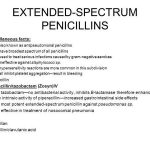
Oral carbenicillin indanyl sodium is used only for the treatment of acute or chronic infections of the upper and lower urinary tract, asymptomatic bacteriuria, or prostatitis caused by susceptible organisms.
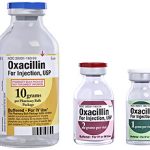
Oxacillin shares the uses of other parenteral penicillinase-resistant penicillins (e.g., nafcillin) and generally is used only in the treatment of infections caused by, or suspected of being caused by, susceptible penicillinase-producing staphylococci. For specific information on the uses of oxacillin, see Uses in the Penicillinase-Resistant Penicillins General Statement 8:12.16.12. Oxacillin sodium is administered by IM injection or slow IV injection or infusion. Although oxacillin has been administered orally, an oral preparation of the drug is no longer commercially available in the US.
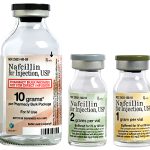
Nafcillin shares the uses of other parenteral penicillinase-resistant penicillins (e.g., oxacillin) and generally is used only in the treatment of infections caused by, or suspected of being caused by, susceptible penicillinase-producing staphylococci. For specific information on the uses of nafcillin, see Uses in the Penicillinase-Resistant Penicillins General Statement 8:12.16.12. Nafcillin sodium is administered by IM injection or by IV injection or infusion. Although nafcillin also has been administered orally, the drug is poorly absorbed from the GI tract and an oral preparation of the drug is no longer commercially available in the US.
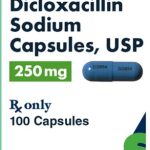
Dicloxacillin shares the uses of other penicillinase-resistant penicillins and generally is used only in the treatment of infections caused by, or suspected of being caused by, susceptible penicillinase-resistant staphylococci. Oral dicloxacillin should not be used for the initial treatment of severe, life-threatening infections, including endocarditis, but may be used as follow-up after therapy with a parenteral penicillinase-resistant penicillin (e.g., nafcillin, oxacillin). For specific information on the uses of dicloxacillin, see Uses in the Penicillinase-Resistant Penicillins General Statement 8:12.16.12.
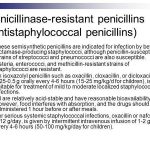
Penicillinase-resistant penicillins are used in the treatment of infections caused by, or suspected of being caused by, susceptible penicillinase-producing staphylococci. Although penicillinase-resistant penicillins have been effective when used in the treatment of infections caused by other susceptible gram-positive aerobic cocci (e.g., Streptococcus pneumoniae, S. pyogenes, nonpenicillinase-producing staphylococci), the drugs are less active than natural penicillins against these gram-positive bacteria in vitro on a weight basis and should not be used in the treatment of infections caused by organisms susceptible to penicillin G and penicillin V.
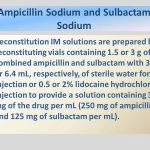
Ampicillin sodium and sulbactam sodium is used parenterally for the treatment of skin and skin structure, intra-abdominal, and gynecologic infections caused by susceptible bacteria. The drug also has been used parenterally for the treatment of other infections, including respiratory tract infections caused by susceptible bacteria.
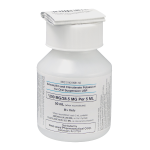
Amoxicillin and clavulanate potassium is used orally for the treatment of lower respiratory tract infections, otitis media, sinusitis, skin and skin structure infections, and urinary tract infections caused by susceptible organisms. Amoxicillin and clavulanate potassium also has been used orally for the treatment of chancroid and gonorrhea caused by susceptible organisms. Amoxicillin and clavulanate potassium has been effective when used orally in adults and children for the treatment of abscesses, cellulitis, and impetigo caused by susceptible penicillinase-producing and nonpenicillinase-producing Staphylococcus aureus and S. epidermidis, Streptococcus pyogenes (group A b-hemolytic streptococci), or Corynebacterium. Results of several controlled studies indicate that amoxicillin and clavulanate potassium is as effective as cefaclor in the treatment of these infections.
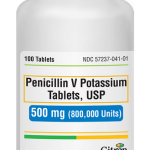
Penicillin V potassium is used for the treatment of mild to moderately severe infections caused by organisms susceptible to low concentrations of the drug or for prophylaxis of certain streptococcal infections. For specific information on the uses of penicillin V potassium, see Uses in the Natural Penicillins General Statement 8:12.16.04.
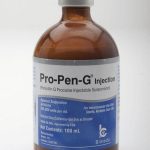
Penicillin G procaine is used only for the treatment of moderately severe infections caused by organisms susceptible to low concentrations of penicillin G or as follow-up therapy to IM or IV penicillin G potassium or sodium. When high penicillin G concentrations are required, IM or IV penicillin G potassium or sodium should be used. For specific information on the uses of penicillin G procaine, see Uses in the Natural Penicillins General Statement 8:12.16.04. Penicillin G procaine is administered by deep IM injection.